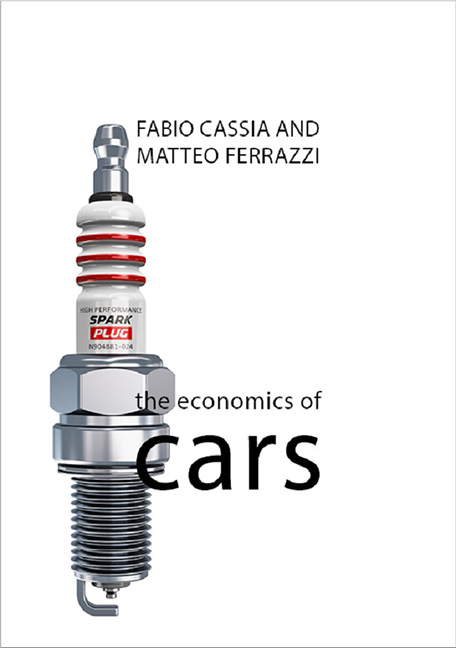5 - The Car of The Future
Published online by Cambridge University Press: 24 August 2023
Summary
“If the Moore’s Law [the number of transistors in a dense integrated circuit doubles approximately every two years] would have been applied to the automotive industry, cars would travel at a 480,000 kilometers per hour and would cost 4 cents.”
Thomas Friedman, American journalistClean, safe and self-driving: this seems to be the future of the car industry. It is a future that is very close, and is already making itself known in the present. Although more than a century has elapsed since the car became a mass product, the sector is far from technologically mature. The most modern cars are increasingly becoming concentrations of technology. Their on-board computers report faults, monitor service requirements and dangers, they are equipped with several high-tech entertainment gadgets, brake and collision avoidance systems, self-parking, and cruise control. The car industry is quick to introduce and embrace revolutionary innovations. In 1914, by putting the car on a conveyor belt, Henry Ford was able to assemble the model T in one hour and 33 minutes, compared to 12 hours and 30 minutes the previous year. Thanks to this revolutionary idea, the price of a car dropped to $450, which represented only five months’ wages for the average American worker. The challenge at that time was in fact to make the car available to a wide audience of potential buyers, or in other words make cars cheaper (Womac, Jones & Roos 1991). Now the needs are different and more complex: customers, for instance, are increasingly sensitive to issues related to global warming and safety. High technology, low power consumption, reliability, comfort, safety, design are needed simultaneously.
Computers and the Internet of Things
The research and the collective imagination has focused for decades on alternatives to the internal combustion engine. In particular, the considered aim has been to eliminate the dependence on oil and gasoline, even before the first oil shock in 1973, when an oil embargo was proclaimed by the members of the Organization of Arab Petroleum Exporting Countries (OPEC) and oil prices rocketed. But the most essential innovations, which have affected the car industry, have been in the form of electronics and computers.
- Type
- Chapter
- Information
- The Economics of Cars , pp. 81 - 102Publisher: Agenda PublishingPrint publication year: 2018



